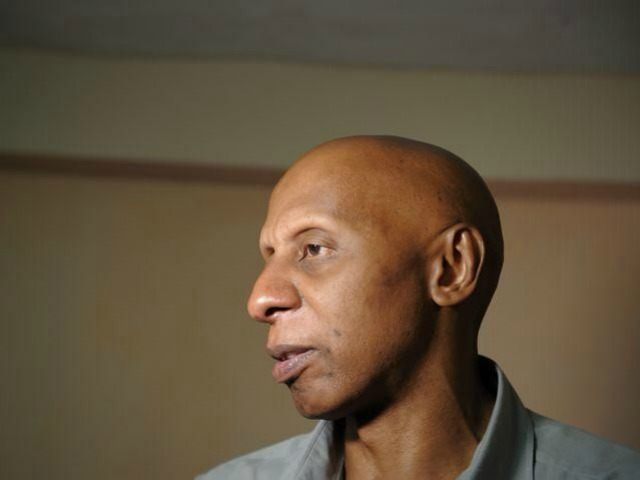Cuban dissident leader Guillermo Fariñas, a recipient of the European Parliament’s Andrei Sakharov Prize, was hospitalized Thursday on the eighth day of his 24th hunger strike. Fariñas was taken to the hospital unconscious and refused treatment upon waking. He continues to refuse to eat or drink water.
Fariñas was hospitalized Thursday, according to dissident allies in Cuba, following a loss of consciousness and entering a state of “shock.” Cuban doctors hydrated him through an IV until he regained consciousness, at which time he refused any treatment and signed himself out of the hospital Friday.
Fariñas’ dissident group, the United Antitotalitarian Forum (FANTU), has issued a statement confirming that Fariñas is home and denying any statements allegedly made by Fariñas on social media while he was hospitalized. They have also uploaded audio of Fariñas confirming on tape that he has voluntarily checked himself out of the hospital and will continue to refuse food and water.
Images of Fariñas at the hospital have also surfaced online:
#AHORA Opositor Fariñas grave en terapia intensiva Hospital en Santa Clara #Cuba #juntoacoco @Declaracion #Venezuela pic.twitter.com/XkyyYp8Psg
— Cristian Crespo F. (@cristiancrespoj) July 29, 2016
Fariñas grave estable y enviado a casa luego de ser hidratado por vía intravenosa. Continúa en huelga… #juntoacoco pic.twitter.com/0lEpJw1eMs
— Cristian Crespo F. (@cristiancrespoj) July 29, 2016
Fariñas has lost more than 26 pounds in the last nine days.
Following news of his hospitalization, Cuban-American allies in Miami organized a peaceful vigil to pray and raise awareness for Fariñas, as well as another 21 Cuban dissidents who are currently on a hunger strike to protest human rights violations by the communist regime of Raúl Castro. Fariñas originally stated one of his reasons for beginning another hunger strike was to support Carlos Amel Oliva, a member of the Patriotic Union of Cuba (UNPACU) dissident group. Oliva is currently on his 16th day of fasting.
“The Cuban regime has increased its repression and arrests are happening at a growing rate and more violently on the island,” UNPACU leader Jose Daniel Ferrer, currently in Miami, told Spain’s EFE newswire service.
Most of the 21 hunger strikers are UNPACU members, but the organization has called on Fariñas specifically to cease his own hunger strike due to his delicate health, a product of his 23 other hunger strikes. Fariñas needs to take eleven medications a day to compensate for the damage he has done to his body on previous hunger strikes and has required reconstructive lung surgery. He is also at a heightened risk of suffering from blood clots.
In an open letter, the UNPACU leadership asserts Fariñas “has nothing left to prove to anyone” and warns that “one day of hunger strike” for Fariñas “is the equivalent of ten for a young and healthy man.”
Fariñas has refused to cease his hunger strike and has placed the responsibility of his death on the communist dictatorship.
Fariñas began his hunger strike after a particularly violent attack against his person for inquiring about Oliva’s health at a police station. He asserts that he was beaten to the point of having two of his ribs fractured and tortured, with police pulling his tongue out until it turned “black.” He has promised to end his hunger strike when “Raúl Castro says publicly to everyone that there will be no more torture, no more beatings, no more death threats, no more false charges against opposition and arbitrary confiscation.”
During President Barack Obama’s trip to Cuba in March, Castro denied the existence of political prisoners and made no mention of the violent repression of dissidents.
Fariñas, who in 2010 won the European Parliament’s Andrei Sakharov Prize for human rights advocacy and the Truman-Reagan Medal of Freedom from the Victims of Communism Memorial Foundation in 2015, has been an outspoken critic of President Obama. Following the initial announcement of the beginning of the “normalization” process in 2014, Fariñas said he felt “betrayed” by President Obama. “We live in daily fear that we will be killed by the fascist government. And now, the US – our ally – turns its back on us and prefers to sit with our killers,” he said.
Fariñas has been a vocal critic of Obama’s “normalization” of diplomatic relations with Cuba, arguing that such moves without demanding the Castro regime cease violating human rights emboldens the oppressors.
The Cuban government was once happy to let pro-democracy hunger strikers die. Among the most prominent of these was Orlando Zapata Tamayo, who died of starvation in 2010 amid a hunger strike. Fariñas protested his death with a hunger strike of his own.
The last time a dissident appeared on the brink of death, however, the Cuban government refused to let him go. To prevent an international incident from ensuing if Vladimir Morera Bacallao had died, he was fed and hydrated against his will after more than 80 days of refusing food or water. According to multiple United Nations documents, forced feeding of hunger strikers is a human rights violation. The UN did not protest Cuba’s actions towards Bacallao, however.

COMMENTS
Please let us know if you're having issues with commenting.